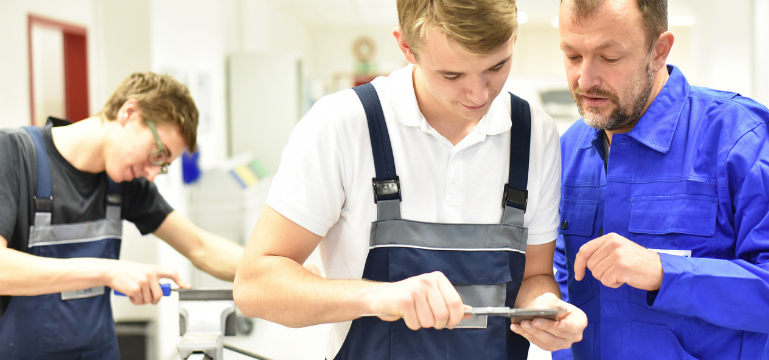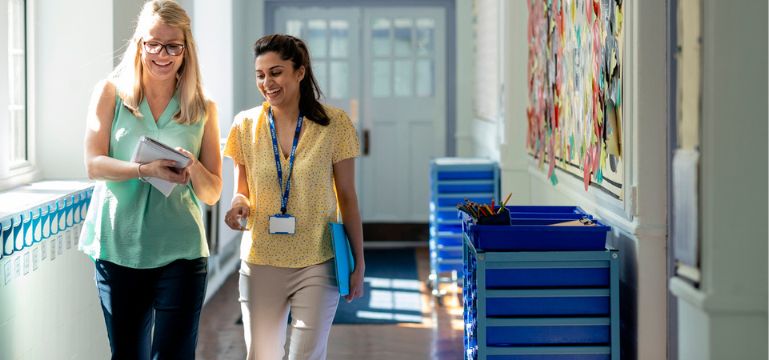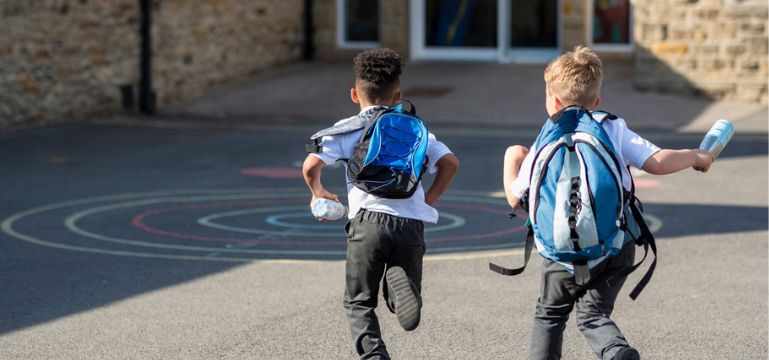Information about the school
Haberdashers’ Monmouth School for Boys is an independent day and boarding school situated in the Wye Valley, with a rich history extending over 400 years. There are currently 472 pupils on roll, which includes 126 boarders and 171 in its co-ed Sixth Form. A number of scholarships and bursaries are available for pupils joining in Years 7, 9 and 12, and applications are open to all candidates, whether boarders or day pupils.
Context and background to the effective or innovative practice
The Monmouth School for Boys library comprises a large, dedicated, friendly, inclusive and popular resource space, staffed with trained librarians. The library blends the latest resource provision research and thinking with the historic values of the school, to create a welcoming and multi-functional academic resource area and well-being haven. The library’s aims include promoting, encouraging and inspiring reading, literacy, study, research, relaxation and well-being for the school community, whilst also supporting wider academic and pastoral needs, school community activities and initiatives.
The library offers a welcoming, comfortable space with dedicated areas for study, teaching, relaxation, well-being, IT based research and discussion areas for pupils and the school community. Space and furniture have been thoughtfully designed to be as flexible as possible, and usable for larger events as required. An ‘open to all’ policy, together with good relationships with academic departments ensures fiction and non-fiction resources match the curriculum and are promoted to the school community. The use of the library for activities, lessons and events by departments and the wider school community ensures that even ‘non-readers’ are engaged in the library on a regular basis and benefit from its stock and resources, enabling it to support and reach the whole school community.
Description of nature of strategy or activity
A few of the library initiatives provide are listed below:
Reading Challenges, Inspiration and Dedicated Library Lessons:
The library promotes literacy, reading for pleasure, research, well-being and academic support through reading schemes including:
- Book Breakout – (formerly SpineCrackers) is a challenge encouraging reading without restricting pupil choice. Focusing on themes rather than set titles helps retain interest and engagement, whilst also enhancing well-being, self-improvement, personal achievement, critical thinking, empathy, resilience etc.

- Maths Reading Challenge – (example of specific reading challenges run with academic departments) Pupils choose, read and review books with a maths related theme. Reviews are then displayed in the department and library for all pupils to interact with.
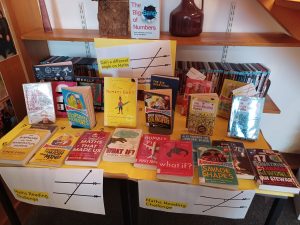
- Wild About Reading Challenge – new Year 7s receive an introductory library session in Year 6 where they are challenged to borrow a book to read and review in a ‘wild’ place – encouraging reading and literacy whilst relaxing for wellbeing.
- Dedicated Library Lessons – weekly timetabled ‘reading for pleasure’ lessons for English pupils in Years 7 – 9, hosted in the library. The library also teaches research skills through timetabled Year 7 programme, as well as popular bespoke research lessons for subject classes and Sixth Form on request and as part of extended project qualification (EPQ).
- Inspirational Displays on timely events or literary themes (e.g. COP28 and National Storytelling Week) encourage a love of reading, learning and knowledge. Regular Library newsletters – both printed and interactive online versions, are also enjoyed.

- Diverse reading materials – such as ‘Quick Picks’, ‘Dyslexia friendly’ and graphic novels, different language resources etc., including e-versions, are available to maximise inclusion.
‘Shelf Help’, ‘Breakout Interact Understand’ and Happy Café:
- ‘Shelf Help’ is a dedicated wellbeing resource collection and area, which includes printed lists of non-fiction wellbeing resources including ‘Anti-Bullying’, ‘Friendship’, ‘Confidence’, ‘Diversity’ etc. Interactive online versions are also available – students ‘click’ on a book to open the catalogue, view details or reserve it.
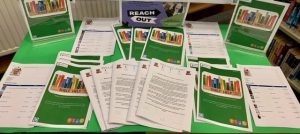
- ‘Breakout Interact Understand’ is a companion booklet to ‘Shelf Help’ (printed and online), featuring fiction wellbeing resources, promoting empathy, resilience and greater understanding.
- Happy Café, situated alongside ‘Shelf Help’, enables immediate access to well-being resources and a relaxation area for pupils if they are struggling or upset. It also acts as a pastoral meeting point for pupils, mentors or staff. A fridge is available to store drinks and library staff can offer support if needed.
Other events:
- Buddy Breakfasts are run by the head of wellbeing and hosted in the library. Form groups enjoy pastries and hot chocolate, meet Sixth-Form mentors, peruse ‘Shelf Help’ and library resources or simply relax.
- Staff Book Breaks enable staff to browse and borrow resources and catch up with colleagues over coffee and cake.
- Other events – the Harry Potter party night for Year 7 includes science demonstrations for ‘potion-making’, literacy with a literary quiz, sport with ‘Quidditch’, and ‘helpers’ from different year groups. The library also hosts author visits, many departmental events, including geography and history talks, debates, school and public performances among others.
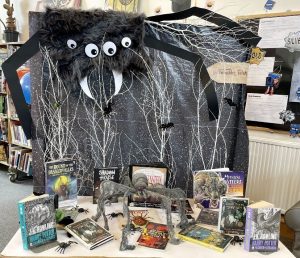

Offering a welcoming pastoral space to support students and staff:
- In addition to formal study space, six comfortable sofas enable pupils to curl up and read or relax. The ‘open to all’ policy means that anyone from the ‘walking wounded’ to pupils struggling academically or emotionally feels able to find a safe haven in the library.
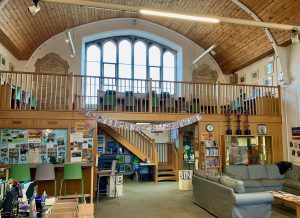
Providing information-rich, easily accessible online Library resources:
- E-Library provision ensures easy access to online reading (audio and e-books). Multi-language functions enable English as an additional language (EAL) pupils to ‘toggle’ between their home language and English to aid their understanding and vocabulary.
- Oodles – the online library database of journals and websites is accessible 24/7. It includes an online library catalogue, e-book library, reading lists and research/study tips and tutorials.
What impact has this work had on provision and learners’ standards?
Reading schemes have been very popular with Key Stage 3 pupils. This has boosted literacy, reading for pleasure and interest in library resources, both fiction and non-fiction. More than 30 awards for completing the bronze, silver or gold challenges have been given so far and hundreds more reviews for multiple books read have been submitted. As a result, teachers have seen a positive impact on quality of creative writing and improvements to vocabulary and accuracy.
Since 2021, when these reading schemes were introduced, borrowing has more than trebled. The boys are borrowing almost as many books from the shared multi-site collection as girls at the sister school, bucking the national trend where the gender gap in reading enjoyment has “increased threefold between 2020 and 2022” (National Literacy Trust, 2022).
Hosting and providing events and activities for the whole school community, including lessons and support for academic and other events, has helped the school more effectively to highlight everything the library has to offer – both academically and in general life. This enables pupils to expand their knowledge, research more thoroughly, and spend more time in the library studying or taking part in work related activities.
By providing well-being events, resources and a safe space, the Library is known as a friendly and safe space, open to all who need it. Regular verbal feedback on initiatives from all areas of the school community also highlights the positive impact the library is having on pupils’ standards and pastoral support.
How have you shared your good practice?
The Shelf Help booklets and initiative have been previously highlighted in an Estyn ‘good practice’ publication and staff attend professional group meetings to share good practice and ideas with other school librarians. The Head of Libraries was featured in the honours list for the School Librarian of the Year Award 2023, with various publicity surrounding the school library practices.











